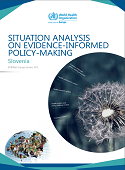Situation analysis on evidence-informed policy-making: Slovenia (2017)

Download
EVIPNet Europe Series, No 1
Slovenia was one of the first Member States in the WHO European Region to demonstrate its commitment to the principles of strengthening evidence-informed policy-making (EIP) when it joined WHO/Europe’s Evidence-informed Policy Network (EVIPNet Europe) in 2013. Alongside capacity-building efforts, one of the key needs identified by the Slovene Ministry of Health was to build a well-functioning EIP infrastructure.
The situation analysis provides a snapshot of the local context with regard to EIP. It gathers background information that supports a systematic and comprehensive reflection on the most important local factors that will support or inhibit the establishment of such EIP infrastructure. It is based on information gathered from publicly available documents, national laws and regulations in the health sector, papers and reports, and outcomes of 3 workshops organized between 2014 and 2015.
The situation analysis is divided into 4 areas: 1) general country context; 2) national health system; 3) national health-research system; and 4) EIP processes.
One of the central findings in the situation analysis is that public health research activities in Slovenia are not always in line with policy priorities. At this stage, the country does not have an infrastructure or platform to bridge the gap between policy-making and research in a systematic sustainable manner. However, regulatory frameworks that provide a basis to develop EIP institutionally are already being developed and the country’s research team is working to formulate concrete recommendations aimed at strengthening EIP and knowledge translation in Slovenia.



